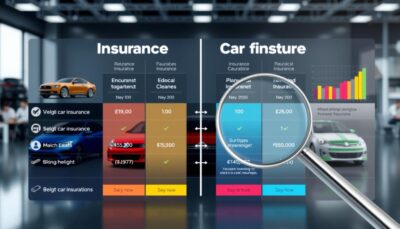Renewing my car auto insurance comparison policy made me nervous. With the cost of living going up, I wanted to cut my monthly payments. I set out to find the best rates and save money without losing coverage.
In this article, we’ll show you how to compare car auto insurance. We’ll give you the tools to choose the right policy for your needs and budget. Whether you’re an experienced driver or new to insurance, our advice will help you confidently navigate the insurance world.
Table of Contents
Key Takeaways
- Understand the importance of car auto insurance comparison and the legal requirements in your state
- Explore the various coverage options and deductibles to find the right fit
- Leverage online tools and comparison websites to efficiently compare rates and policies
- Familiarize yourself with policy language and important terms to make informed decisions
- Evaluate customer reviews and ratings to ensure a positive claims experience
Understanding the Importance of Car Insurance
In today’s fast world, car insurance is a must, not just a luxury. Whether you’re driving in the city or on the highway, the right policy coverages protect your vehicle and money.
Protecting Your Vehicle and Finances
Car insurance is a shield against the unexpected. It covers costs from small accidents to big ones. Liability coverage pays for repairs or replacements, and collision coverage helps with expensive fixes.
Legal Requirements for Auto Insurance
- Most U.S. states require a minimum of car insurance to drive legally.
- The policy coverages and limits change by state, so know your area’s rules.
- Not having insurance can lead to big fines, license loss, or even jail, so keep coverage up.
Car insurance might seem like an extra cost, but it’s worth it for peace of mind and financial safety. Knowing why car insurance is important helps you make smart choices. This way, your vehicle and money stay safe, no matter what.
What to Consider in Car Insurance Policies
When you’re looking at car insurance, it’s important to know about coverage options, deductibles, and discounts. These things can really change how much you pay for your premium quotes and what your policy coverages include. Let’s explore these details to help you choose wisely.
Coverage Options Explained
Car insurance policies usually have several coverage types. These include liability, collision, comprehensive, personal injury protection, and uninsured/underinsured motorist coverage. Liability helps if you’re at fault in an accident. Collision and comprehensive cover your vehicle. Knowing which policy coverages you need is key to finding the right policy.
Deductibles: What You Need to Know
The deductible is the amount you pay before your insurance starts covering costs. A higher deductible means lower premium quotes, but you’ll pay more if you make a claim. Think about your budget and how much risk you’re okay with when picking a deductible.
Discounts Available
- Safe driving record: A clean driving history can get you discounts eligibility.
- Vehicle safety features: Cars with advanced safety features might qualify for discounts.
- Multi-policy discounts: Insuring your car and other policies together can save you money.
- Good student discounts: High GPA can earn discounts eligibility for young drivers.
Understanding these key points helps you compare policy coverages, discounts eligibility, and premium quotes from different insurers. This way, you can find the best car insurance policy for you.
How to Start Your Car Insurance Comparison
Comparing car insurance can seem tough, but it’s doable. You can find the right coverage for your budget and needs. Start by getting all the info you need and figuring out what coverage you want.
Gather Necessary Information
Before comparing car insurance rates, make sure you have these details:
- Your personal info, like name, address, birthdate, and driver’s license number
- Info about your vehicle, including make, model, year, and VIN
- Your current insurance policy, including coverage, deductibles, and premium
- Your driving history, including accidents, tickets, or claims
Determine Your Coverage Needs
Next, think about what coverage you need. Consider these factors:
- Liability coverage: This pays for damages or injuries you cause to others. Most states require it.
- Collision and comprehensive coverage: This protects your car in accidents or other incidents like theft.
- Uninsured/underinsured motorist coverage: This helps if you’re hit by someone with little or no insurance.
- Personal injury protection (PIP) or medical payments coverage: This covers medical costs for you and your passengers, no matter who’s at fault.
With the right info and coverage needs, you’re ready to compare car insurance rates. You’ll find the policy that fits your vehicle and budget.
Popular Car Insurance Providers
Finding the right car insurance can be tough. We’ll look at the big national companies and some regional ones. They offer different coverage and rates.
Overview of Major Insurers
A few big names lead the car insurance market. State Farm, Geico, Progressive, Allstate, and USAA are well-known. They have many coverage types and offer discounts for good driving and bundling policies.
Regional Insurance Companies
Don’t overlook regional companies for personalized service and lower rates. Amica Mutual, Erie Insurance, and Auto-Owners Insurance are known for great service and prices.
When picking an insurance, look at coverage, prices, and customer feedback. Reviews can tell you a lot about claims, support, and satisfaction.
“Researching various insurance providers and their customer reviews helped me find the best coverage for my needs at a price I could afford.”
Online Tools for Car Insurance Comparison
Online tools can greatly help in finding the best car auto insurance rates. They let us compare quotes from many providers easily. This makes finding the right insurance much simpler.
Benefits of Using Comparison Websites
Using online car auto insurance comparison websites has many benefits:
- Convenience: We can quickly look at many insurance options from home.
- Comprehensive Data: These sites gather info from many insurers, giving us a full view of what’s available.
- Time-Saving: They save us from having to call each insurance company ourselves, saving time and effort.
- Informed Decisions: They show us all the policy details and prices, helping us make better choices.
Features to Look for in Comparison Tools
When picking an online car auto insurance comparison tool, look for these features:
- Customization Options: The ability to adjust the comparison to fit our specific needs, like coverage and vehicle details.
- Real-Time Pricing: Up-to-date quotes that show the current market prices.
- Side-by-Side Comparisons: A clear way to see how different policies compare.
- User Reviews and Ratings: Feedback on the quality of service and customer satisfaction.
Online car auto insurance comparison tools help us confidently find the best deals. They let us compare quotes and make choices that fit our needs and budget.
Reading the Fine Print
Understanding car insurance policies can be tough. But knowing the fine print is key to getting the right coverage. We’ll help you through the policy language and explain important terms.
Understanding Policy Language
Car insurance policies use a lot of technical terms. This can make it hard to understand what you’re getting. We’ll simplify the language for you, so you know what you’re buying.
Important Terms to Know
Terms like liability coverage and collision coverage are crucial. We’ll cover these and more, so you can choose the right coverage for you.
| Term | Definition |
|---|---|
| Liability Coverage | Covers damages and injuries you cause to others in an accident. |
| Collision Coverage | Covers the cost of repairing or replacing your vehicle if it’s damaged in a collision. |
| Deductible | The amount you pay out-of-pocket before your insurance coverage kicks in. |
| Exclusions | Specific situations or circumstances not covered by your policy. |
By understanding your car insurance policy, you can make better choices. This ensures your vehicle and finances are protected.
Evaluating Customer Reviews and Ratings
Choosing the right car insurance provider is important. Customer reviews and ratings can help a lot. They give insights into a company’s services, claims process, and customer support.
Checking for Claims Satisfaction
Customer satisfaction with claims is key. Look for feedback on how quickly claims are settled and how responsive the claims team is. This shows how well the company handles claims.
Importance of Customer Support
Customer support is also crucial. Good customer service can greatly improve your experience. Look for reviews that praise the help and professionalism of the customer service team.
| Insurance Provider | Customer Review Score | Claims Satisfaction | Customer Support |
|---|---|---|---|
| Company A | 4.7/5 | Excellent | Responsive and Helpful |
| Company B | 4.2/5 | Average | Mixed Reviews |
| Company C | 4.5/5 | Good | Friendly and Knowledgeable |
By looking at customer reviews and ratings, we can understand how insurance providers do. This helps us make a smart choice for our car insurance needs and budget.
How Claims Processes Affect Your Choice
Choosing an auto insurance provider means looking at the claims process closely. How well a company handles claims greatly affects your satisfaction. Let’s dive into the steps of filing a claim and why it’s important to get your claim settled fast.
Steps in Filing a Claim
The claims process usually goes like this:
- Reporting the incident: Tell your insurance company right away after an accident.
- Providing relevant information: Give them all the details about what happened, like the date and location.
- Damage assessment: They might send someone to check your car and figure out the repair cost.
- Claim approval: If they say yes to your claim, they’ll pay for the repairs or replacement.
Timeliness of Claims Settlement
How fast an insurance company settles claims matters a lot. Quick claims mean you can get your car fixed and back on the road sooner. This keeps your life running smoothly. Look at how fast different companies process claims and how happy their customers are with the service.
A table comparing the average claims processing time and customer satisfaction ratings for leading auto insurance providers can provide valuable insights:
| Insurance Provider | Average Claims Processing Time | Customer Satisfaction with Claims Process |
|---|---|---|
| State Farm | 7 days | 4.8 out of 5 |
| Geico | 10 days | 4.6 out of 5 |
| Progressive | 12 days | 4.5 out of 5 |
| Allstate | 14 days | 4.3 out of 5 |
By looking at the claims process and how fast claims are settled, you can pick the best auto insurance for you.
Long-term Savings Strategies
Finding ways to save on car insurance can really help your wallet. Two good strategies are bundling insurance and keeping a clean driving record.
Bundling Insurance Policies
Many insurers give discounts if you bundle car insurance with other policies. This can include homeowner’s or renter’s insurance. By getting all your coverage from one place, you might save a lot over time. This makes managing your insurance easier and can help you get discounts eligibility and better rates comparison.
Maintaining a Clean Driving Record
- Keeping your driving record clean is a big way to save on insurance.
- Staying away from tickets, accidents, and claims shows you’re a safe driver. This can lead to maintaining a clean driving record and getting discounts from insurers.
- Many insurers give discounts to safe drivers. This can mean big savings over time.
| Savings Strategy | Potential Benefits |
|---|---|
| Bundling Insurance Policies | Discounts on combined policies, simplified insurance management |
| Maintaining a Clean Driving Record | Discounts for safe driving history, lower overall premiums |
Using these long-term savings strategies can help you control your car insurance costs. You’ll also have the peace of mind that comes with affordable and reliable coverage.
The Role of State Regulations
State regulations play a big role in car insurance. Each state has its own rules and laws. These rules affect what kind of insurance you need and how much it costs. It’s important to understand these rules to find the right insurance for you.
Understanding Minimum Coverage Requirements
State regulations set minimum coverage rules for car insurance. These rules tell you the basic protection you must have to drive legally. The specific rules vary, but they usually include:
- Bodily injury liability coverage
- Property damage liability coverage
- Personal injury protection or no-fault coverage
Knowing your state’s minimum requirements helps you choose the right insurance. It lets you compare different options better.
Impact of State Laws on Premiums
State laws also affect how much you pay for car insurance. Things like how many people live in the state and the cost of living can change rates. Learning about your state’s auto insurance can help you find good deals.
“Understanding the role of state regulations is essential for finding the right car insurance policy that meets your needs and budget.”
Keeping up with state laws and their effect on insurance costs helps you make a smart choice. This knowledge lets you find insurance that protects you without breaking the bank.
When to Review Your Auto Insurance Policy
Having the right auto insurance is key to protecting your car and money. Life changes often, so it’s important to check your policy regularly. This ensures it still meets your needs. Let’s look at when and how often you should review your auto insurance.
Life Changes that Trigger a Review
Several life events might make you want to look at your auto insurance. These include:
- Purchasing a new vehicle
- Moving to a new home or state
- Getting married or divorced
- Adding or removing drivers from your policy
- Significant changes in your annual mileage
- Reaching a new age or life stage (e.g., becoming a teen driver or retiring)
Frequency of Policy Assessments
There’s no set rule for how often to check your auto policy coverages and premium quotes. But, it’s wise to do this at least once a year. This yearly check can help you see if your needs have changed or if you can save money.
Also, review your policy after big life events. This way, you can make sure you’re covered right and at a good price. Being proactive can help you avoid paying too much or not enough for your policy coverages and premium quotes.
“Regularly reviewing your auto insurance policy can save you money and ensure you have the right coverage for your needs.”
Final Tips for a Successful Comparison
When comparing car auto insurance comparison rates and coverage, staying organized is key. Think about different scenarios that might change your choices. This way, you can find the right policy for you.
Stay Organized and Notes on Coverage
Keep detailed notes on coverage options, deductibles, and discounts from each provider. Track things like liability limits, collision and comprehensive coverage, and extra features. This helps you compare plans and choose the best one.
Different Scenarios to Consider
When looking at car auto insurance comparison and rates comparison, think about future scenarios. For example, how might your insurance needs change if you move, get married, or buy another car? Also, consider your driving habits, car type, and financial changes. This helps you pick a policy that’s right for you now and in the future.
FAQ
What is the importance of car insurance?
Car insurance is key for protecting your vehicle and finances. It covers costs from accidents, theft, and other surprises. Most states require it, so you must have the minimum coverage.
What are the key coverage options in car insurance policies?
Policies usually have liability, collision, comprehensive, and uninsured/underinsured motorist protection. Knowing these options is important when comparing insurance.
How do deductibles work in car insurance?
Deductibles are what you pay before insurance kicks in. A higher deductible lowers your monthly payments but means you’ll pay more if you need to file a claim.
What types of discounts are available for car insurance?
Insurers offer discounts for safe driving, good credit, and more. These discounts can greatly reduce your premium costs.
How can I start comparing car insurance options?
Start by gathering info like your driving history and vehicle details. Use online tools to compare rates and find the best policy for you.
What are the most popular car insurance providers?
Top national providers include Geico, Progressive, State Farm, Allstate, and USAA. Regional companies also offer competitive rates and coverage.
What are the benefits of using online car insurance comparison tools?
Online tools save time by comparing quotes from multiple insurers. They offer features like side-by-side comparisons and customer reviews to help you choose.
How do I read and understand the fine print of an insurance policy?
Read policy language carefully to understand terms like liability and collision coverage. This helps you find the right policy for your needs.
How do customer reviews and ratings affect my choice of insurance provider?
Reviews and ratings show an insurer’s reputation and service quality. They help you pick a provider that will serve you well when you need to file a claim.
What are the typical steps in the car insurance claims process?
The process includes reporting the incident and providing documents. It’s important to choose an insurer that handles claims efficiently.
How can I achieve long-term savings on my car insurance?
Save by bundling policies, driving safely, and using discounts. Regularly review your policy to find ways to lower costs.
How do state regulations affect car insurance requirements and premiums?
State laws impact minimum coverage and premiums. Knowing your state’s rules is key to finding the right policy and rates.
When should I review my car insurance policy?
Review your policy after big life changes like buying a new car or getting married. This ensures your coverage is up to date and you’re getting the best rates.
What final tips can you provide for a successful car insurance comparison?
Keep detailed notes on your research. Consider how your needs might change, like with new family members. This helps you choose the right policy for your life.







